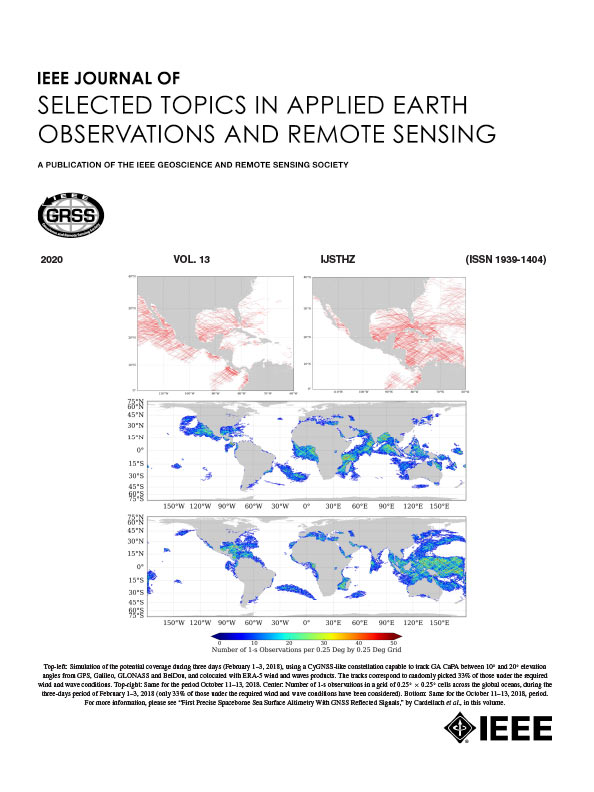Enhancing, Refining, and Fusing: Towards Robust Multiscale and Dense Ship Detection
IF 4.7
2区 地球科学
Q1 ENGINEERING, ELECTRICAL & ELECTRONIC
IEEE Journal of Selected Topics in Applied Earth Observations and Remote Sensing
Pub Date : 2025-04-01
DOI:10.1109/JSTARS.2025.3556893
引用次数: 0
Abstract
Synthetic aperture radar (SAR) imaging, celebrated for its high resolution, all-weather capability, and day-night operability, is indispensable for maritime applications. However, ship detection in SAR imagery faces significant challenges, including complex backgrounds, densely arranged targets, and large scale variations. To address these issues, we propose a novel framework, Center-Aware SAR Ship Detector (CASS-Det), designed for robust multiscale and densely packed ship detection. CASS-Det integrates three key innovations: 1) a center enhancement module (CEM) that employs rotational convolution to emphasize ship centers, improving localization while suppressing background interference; 2) a neighbor attention module that leverages cross-layer dependencies to refine ship boundaries in densely populated scenes; and 3) a cross-connected feature pyramid network (CC-FPN) that enhances multiscale feature fusion by integrating shallow and deep features. The proposed model achieves mean Average Precision of 99.2%, 93.1%, and 82.1% on the SSDD, HRSID, and LS-SSDD datasets, surpassing the second-best methods by 1.2%, 1.8%, and 1.8%, respectively, which demonstrates its effectiveness.增强、完善和融合:实现稳健的多尺度和密集型船舶探测
合成孔径雷达(SAR)成像以其高分辨率、全天候能力和昼夜可操作性而著称,是海事应用中不可或缺的。然而,合成孔径雷达成像中的船舶探测面临着巨大的挑战,包括复杂的背景、密集排列的目标和大尺度的变化。为了解决这些问题,我们提出了一个新颖的框架,即中心感知合成孔径雷达船舶探测器(CASS-Det),该框架专为稳健的多尺度和密集型船舶探测而设计。CASS-Det 集成了三项关键创新:1) 中心增强模块 (CEM),利用旋转卷积来强调船舶中心,在抑制背景干扰的同时提高定位能力;2) 邻居关注模块,利用跨层依赖关系来完善密集场景中的船舶边界;3) 交叉连接特征金字塔网络 (CC-FPN),通过整合浅层和深层特征来增强多尺度特征融合。所提出的模型在 SSDD、HRSID 和 LS-SSDD 数据集上的平均精确度分别达到 99.2%、93.1% 和 82.1%,比第二好的方法分别高出 1.2%、1.8% 和 1.8%,证明了其有效性。
本文章由计算机程序翻译,如有差异,请以英文原文为准。
求助全文
约1分钟内获得全文
求助全文
来源期刊
CiteScore
9.30
自引率
10.90%
发文量
563
审稿时长
4.7 months
期刊介绍:
The IEEE Journal of Selected Topics in Applied Earth Observations and Remote Sensing addresses the growing field of applications in Earth observations and remote sensing, and also provides a venue for the rapidly expanding special issues that are being sponsored by the IEEE Geosciences and Remote Sensing Society. The journal draws upon the experience of the highly successful “IEEE Transactions on Geoscience and Remote Sensing” and provide a complementary medium for the wide range of topics in applied earth observations. The ‘Applications’ areas encompasses the societal benefit areas of the Global Earth Observations Systems of Systems (GEOSS) program. Through deliberations over two years, ministers from 50 countries agreed to identify nine areas where Earth observation could positively impact the quality of life and health of their respective countries. Some of these are areas not traditionally addressed in the IEEE context. These include biodiversity, health and climate. Yet it is the skill sets of IEEE members, in areas such as observations, communications, computers, signal processing, standards and ocean engineering, that form the technical underpinnings of GEOSS. Thus, the Journal attracts a broad range of interests that serves both present members in new ways and expands the IEEE visibility into new areas.

 求助内容:
求助内容: 应助结果提醒方式:
应助结果提醒方式:


